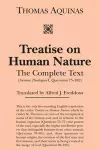
Treatise on Human Nature – The Complete Text (Summa Theologiae I, Questions 75–102)
2 authors - Paperback
£16.00
Alfred J. Freddoso teaches philosophy at Notre Dame and is an outstanding translator of medieval Latin.
From reviews of previous translations by Alfred J. Freddoso:
Francisco Suarez, On Efficient Causality: Metaphysical Disputations 17, 18, and 19 (Yale University Press, 1994):
“Freddoso is medieval philosophy’s best and most prolific translator. Here, as in his earlier works, the English is both clear and faithful to the original.” – The Philosophical Review
William of Ockham, Quodlibetal Questions (with Francis Kelley) (Yale University Press, 1991):
“These volumes are the first in the Yale Library of Medieval Philosophy. . . . It is an auspicious beginning.” – The Philosophical Review
“[This serves] to indicate the brilliance of the translators at understanding the intricacies and subtleties of medieval scholastic Latin, and their sensitivity to modern readers’ needs and problems.” – The Thomist
“The translation is excellent.” – Manuscripta
Luis de Molina, On Divine Foreknowledge: Part IV of the Concordia (Cornell University Press, 1988):
“To refer to this volume as Freddoso’s ‘translation’ of Molina is correct but woefully inadequate.” – Faith and Philosophy
“Freddoso’s translation and introduction are, quite simply, splendid pieces of work.” – International Philosophical Quarterly
Ockham’s Theory of Propositions: Part II of the Summa Logicae (with Henry Schuurman) (Notre Dame Press, 1980; reprinted St. Augustine’s, 1998):
“Well executed . . . a superb effort, worthy of the attention not only of historians but also of anyone seriously interested in philosophical semantics.” – Philosophical Review
Francisco Suarez, s.j. , On Creation, Conservation, and Concurrence: Metaphysical Disputations 20, 21, and 22 (St. Augustine’s Press, 2002)
“Freddoso is a first-rate translator of this material, and his rendering manages to be both literal and elegant.”– Journal of Theological Studies
“Freddoso is extraordinarily careful here (as in other translations) to make the text as clear as possible to non-Latin readers. . . . The translation itself is close, accurate, and concise.” – Theological Studies